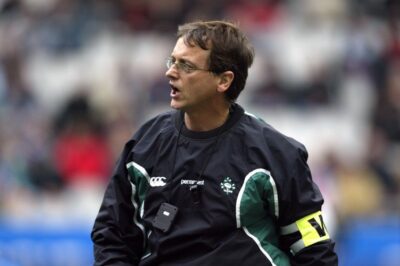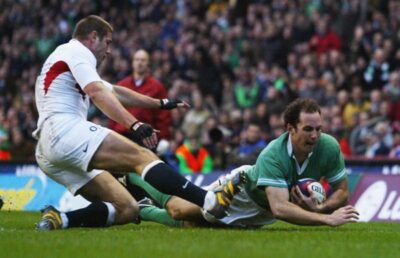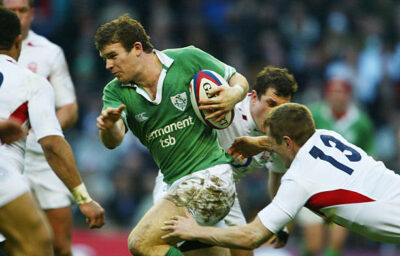Ireland look to start their Six Nations defence with a win as England come to town for the opener at the Aviva Stadium. Whatever about the Championship title, the stark reality is that no team (in the 6Nations era) has managed back to back Grand Slams. Only for Johnny Sexton’s kick last year, and a few other incredibly close encounters, there wouldn’t be a defence to mount in the first place.
If we go back to the last time a back to back Grand Slam was achieved the victorious French team was packed with stars. Thomas Castaignède, Fabien Galthie, Raphaël Ibañez, Olivier Magne, Émile Ntamack, Fabien Pelous, et al.

Dr. Liam Hennessy, former Director of Fitness, IRFU.
Fast forward to 2004 and England kicked off the Six Nations as Grand Slam Champions AND World Champions. The headlines of The Guardian Newspaper, from the day after that match, just about summed up the stunned reaction after their national pride was well and truly dragged through the muck of Twickenham:
“White knights who conquered the world in November lose their 22-match victorious home run in shambles of loose lineout throwing and lack of direction that played into the hands of determined opponents”.
Now it is Ireland’s turn. After a truly historic 2018 we head into 2019 with the eyes of the world on the men in green. Six Nations Champions. Holders of the Triple Crown. Second only to the All Blacks in the world rankings. Mounting a Grand Slam defence, just like England in 2004. And as Dr. Liam Hennessy describes, the best laid plans of mice and men often go awry!
Dr. Liam Hennessy was appointed IRFU Director of Fitness in 2000, a position he held through to 2010 and included two Triple Crowns and the first Grand Slam since 1948. This is Liam’s story of that famous day in Twickenham.
Fifteen years ago, Ireland were in the early stages of building a robust system of player development as well as planning and preparing to catch up on the leading Rugby nations. Within that context and as always it was especially satisfying to play and beat the reigning world cup champions and the Number 1 team in the world then, England, in their home ground at Twickenham on March 6th.

Dempsey scores a try during the Six Nations match between England and Ireland at Twickenham on March 6, 2004.
The strategy for that day was well planned by Head Coach, Eddie O Sullivan, whose tactical plan was to draw the heavy and strong England pack all over the pitch and then to strike through our speedy centres and wingers. The plan worked extremely well and Girvan Dempsey’s 52nd minute try sealed our emphatic win that day with Ireland going on to win another Triple. And that all happened despite Lego’s best efforts to disturb our pre-match preparations!
Let me explain, when we stayed in our hotel the night before the match, most players had what can be described as ‘disturbed’ sleep. Tracking the quality and duration of sleep on match morning before breakfast, it was clear that most players had less sleep than normal. A Lego conference had taken place on the day before the match at our hotel. No, it was not a case of children playing with lego blocks, in contrast, it was lego employees who were in conference at the hotel and also extended their day well into the night.
While Paddy Rala (Team kit man and mentor to many of us) and I did our best to try and keep the noise levels down that night, the noise still impacted on players’ sleep. Was this a cunning ploy to disrupt our focus or simply happenchance?!
As the team bus pulled into the Twickenham grounds, you knew from all the logos and atmosphere that ‘You are now entering England’. These as expected only provided more motivation to our players. The cramped changing room of team England in contrast to the splendid gym backed home was also inspiring for Ireland.
Knowing and expecting pressure and accepting that plans do not run smoothly, should always be looked at positively. Playing the World Cup champions, also added immensely to the occasion. However, the bottom line was that Ireland under Eddie O Sullivan was a very well prepared one, the tactical plan was clear, the players were fit and sharp…Any upset to the count-down plan was not an issue.

Gordon D’Arcy gets away from Will Greenwood at Twickenham on March 6, 2004. (Photo by Jamie McDonald/Getty Images)
Following this match, we embarked on a research programme looking at how sleep affects recovery and performance. There were several interesting findings which we will share with you at a later stage. Here though is a quick summary:
• If you periodise sleep, that is if you can have players add extra sleep (even 45 minutes extra per night) for an extended period – even for one week, then you can expect to see greater physical performance with less fatigue during match play.
• The recovery period following the match is also reduced as a result. This is especially important when there is a short turnaround of one week between games.
So, for all team sports at all levels, plan to get more sleep each night during the week before that important game. Better still, nurture longer sleep each night by using better sleep hygiene. It pays dividends.
And now looking forward to Ireland versus England in the Six Nations 2019. The same rivalry will be there. England will be away. No doubt they will be well prepared and no doubt they will have their tactical plan well and truly ingrained. Ireland are deservedly number 2 in the world. They are also well prepared and being at home is a huge advantage. Ireland players throughout the year are well monitored in terms of not only physical fitness but also in terms of lifestyle management including sleep time and quality. So, whether preparations run smoothly for either team (and we can expect that they will not!) we can undoubtedly expect another momentous occasion.
So, what lessons were learned from that win against England in 2004?
Lesson 1: If routine is upset – focus on the positives of this.
Lesson 2: Get very familiar with the playing environment.
Lesson 3: Don’t worry about the duration or quality of sleep during the night before matchplay, it’s critical though to ensure good quality and duration of sleep in the leadup and nights beforehand, planning well in advance for more and better-quality sleep.
Lesson 4: Don’t assume that lego is all child’s play!


Leave A Comment